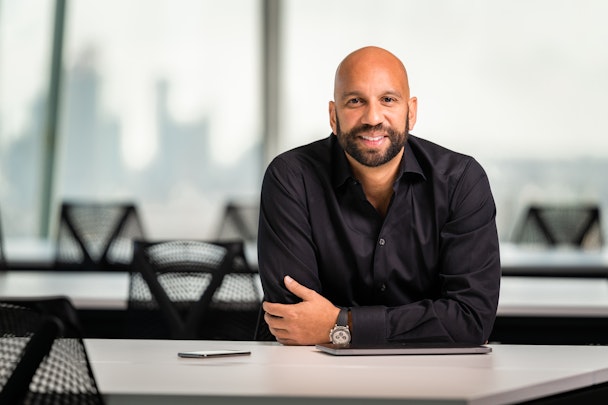Dismantling the job factory: scaling a business with Jellyfish CEO Rob Pierre
Last week, The Drum launched its Better Business interview series with a conversation between Rob Pierre, chief executive officer of Jellyfish, and The Drum’s own chief exec Diane Young. They spoke about the agency’s rapid growth, which has seen its headcount triple in two years, and the bold anti-hierarchical organizational structure that Pierre says is the secret to his success.

Jellyfish boss Rob Pierre
Back in 2019 when it topped The Drum’s Top 100 Independent Agencies list, Jellyfish listed a headcount of 665. Today, despite two of the most difficult years faced by businesses in living memory, it’s a business of over 2,300 people, spread across 47 offices worldwide.
All pretty impressive for a company founded by six people in Reigate in 2005, specializing in paid search for the publishing industry. For boss Rob Pierre, the seeds for recent rapid growth were planted by getting the basics right in those early stages: first, hyper-specialism early to become the leaders in a small field. Second, natural diversification through new technologies, sectors and geographies as demanded by their expanding expertise. Third, speculative investment (especially in people and tech) to be ready to seize opportunities when they arrive.
The final piece of the puzzle is the hardest: building brand equity. Pierre says: “It’s a catch-22. You can’t get the work if you haven’t done it before – and if you haven’t done it before, you’re not going to get the work.” It can be easy to fall into a spiral, but Pierre says the trick is that you don’t need to build your brand in a vacuum.
A key moment in the agency’s growth was a ‘paradigm shift’ in their approach to partners and platforms such as Google, Amazon and Facebook. Most agencies, he says, treat these partners as vendors and themselves as the client, but the real value is in flipping that relationship on its head. “We treated Google as our number one client. We understood who were the decision-makers; strategically what they wanted to achieve. We became masters at using training and supporting their technology and their networks. Then, by proxy, we were able to leverage their brand equity, their reputation. When they started recommending Jellyfish, that’s when we started to get serious traction.”
With the essentials in place and a route out of the branding catch-22 mapped, it’s time to scale – and there’s still upscaling to do; Pierre says he’s right now tackling what he calls a once-in-a-generation opportunity to become a top-three global player in the marketing industry. The business is ready, he says, because it was always built for infinite scalability, with processes and institutions that scale without loss.
To use Pierre’s analogy, everything should be a vector image: robust to building-high expansion (contrasted with jpegs, which will deteriorate in quality as they get bigger). “Everything we do at Jellyfish, whether it’s procedural or the way in which we organize our business, the question is: is this a vector image? Will it survive at 100,000 people? Is it going to make sense when we scale to billions of turnover?”
So far, so sensible. But it’s when Pierre talks about how he has structured his business for growth that you see a radical approach to the workforce underpinning this approach to scaling.
In brief, the business is structured in a way that many would call ‘flat’ – but that’s not a descriptor Pierre would encourage. “The misconception is that it’s flat. It’s not flat; it’s just not a hierarchy.” So, careers do have levels and there is linear progression, but there’s no pyramidal structure. In practical terms, that makes ‘delegation’ a dirty word: “We distribute the accountability, don’t delegate it.” Whoever’s best placed to carry out a piece of work does so, cutting out any hierarchical layers in between. All of which means that line managers, in a traditional sense, are surplus to requirements.
In the place of line managers, each team member has a ‘support network’ – a team of four individuals, with varied and clearly demarcated expertise. The person responsible for developing the key skills of your career will not be the person who supports you on personal matters. Stars of a particular discipline won’t be shepherded into management roles outside of their interests or talents. And since any individual role is not an ‘individual print’, no one needs to leave the business for you to progress.
To Pierre’s mind, the old way of doing things turns every business into a ‘jobs factory’, where most of the workforce spend most of their days just managing people, gradually remaking the company’s purpose to focus solely on maintaining a structure of jobs. Escaping the jobs factory means freeing individuals to make the contributions they are able to make, and progress according to their own goals and achievements.
So goes the theory. But we’ve all, of course, heard radical proposals over the years promising to overthrow the staid old superstructures and replace them with benign utopias of opportunity. Regardless of the actual efficacy of the approach, is it an uphill battle to convince staff and partners of its wisdom? “Very seldom now,” Pierre says, “because that’s the reason that they’re coming to our business. They’ve seen the other side of the coin.”
Members of The Drum Network can watch future Better Business roundtables live (and participate in a Q&A session with the speakers). Next up, we’ll be talking to Bruce Daisley, a former vice-president at Twitter and host of the Eat Sleep Work Repeat podcast about the future of work.

